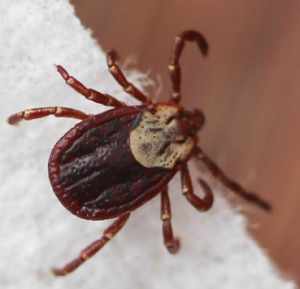

MedFriendly®


Ixodidae
Ixodidae is a family of ticks that is part of the broader
group known as Acarina (or Acari, a group of organisms
that contains mites and ticks). Ticks in this family are
known as hard ticks because they have a rigid body
form and a hard shield (known as a scutum) over the
back part of the body. This feature makes them different
from the other main family of ticks (Argasidae), which is
why they are known as soft ticks. The head (known as
a capitulum) of ticks in the Ixodae family projects from
the front of the body whereas the head of the soft tick
is hidden below the body.
FEATURED BOOK: The Illustrated World Encyclopedia of Insects
Many species of these types of ticks transmit many important diseases to humans and
animals, some of which can cause paralysis (loss of movement and/or sensation). These
types of ticks occasionally attack humans. Some regularly do so.
There are 702 species of Ixodidae in 14 several distinct groups (genera) of ticks in this
family known as Amblyomna (130 species), Anomalohimalaya (3 species), Bothriocroton
(7 species), Cosmiomma (1 species), Cornupalpatum (1 species), Compluriscutula (1
species), Dermacentor (34 species), Haemaphysalis (166 species), Hyalomma (27
species), Ixodes (243 species), Margaropus (3 species), Nosamma (2 species),
Rhipicentor (2 species), and Rhipacephalus (82 species). Ixodidae comes from the
Greek word “ixodes” meaning “sticky.”
"Where Medical Information is Easy to Understand"™















